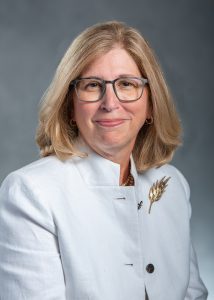Message From Dr. Woodruff

Dear Oncofertility Consortium Community,
The Oncofertility Consortium was created in 2007 to address a significant health care need for cancer survivors. Over the last 14 years, this program has brought together a diverse multidisciplinary group of thought leaders that span several specialties of health care providers, patient advocacy and community engagement groups, researchers, and learners passionate about improving the quality of life for cancer survivors. Northwestern University provided unwavering support for the Oncofertility Consortium vision from the beginning that led to its global impact. We are transitioning the Oncofertility Consortium administration to Michigan State University over the next few months.
We thank those that participated in formulating the Oncofertility Consortium Vision 2030. It was an important next step for the Consortium and will help us work together on our collective priorities for the next 10 years. Vision 2030 Article
Oncofertility Consortium from MSU MD on Vimeo.
Today, male and female adult and pediatric cancer patients, individuals transitioning gender identities, and other individuals facing health-extending but fertility-limiting treatments can look forward to a fertile future. This is, in part, due to the work of members associated with the Oncofertility Consortium. The Oncofertility Consortium is an international, interdisciplinary initiative originally designed to explore the urgent unmet need associated with the reproductive future of cancer survivors. As the strategies for fertility management were invented, developed or applied, the individuals for whom the program offered hope, similarly expanded. As a community of practice, Consortium participants share information in an open and rapid manner that addresses the complex health care and quality-of-life issues of cancer patients, including transgender individuals, and other patients. Our global interprofessional network of medical specialists, scientists, and scholars in the law, medical ethics, religious studies, and other disciplines associated with human interventions, explore the relationships between health, disease, survivorship, treatment, gender, and reproductive longevity. The goals are to continually integrate the best science in the service of the needs of patients and build a community of care that is ready for the challenges of the field in the future.
Together we discussed the current state of the field, the priorities for the next 10 years, and the strategies to be used to ensure that the field is moving forward in a productive and collaborative manner. We worked together on developing the Oncofertility Consortium Vision 2030, as well as its mission, value statements, and strategic goals. Here are the results:
Vision Statement: The vision of the Oncofertility Consortium is for all patients facing loss of fertility due to medical conditions and/or gonadotoxic therapies to have access to oncofertility options and services.
Mission Statement: The mission of the Oncofertility Consortium is to convene the field to enable the essential conversations necessary to drive oncofertility research, clinical practice, and patient options forward.
Value Statement: The Oncofertility Consortium values collegiality, multi-disciplinary collaboration, inclusiveness, innovation, and altruism. All of its values are ultimately driven by patient-centeredness.
Strategic goals: (1) Improve Access (2) Advance Research (3) Educate and (4) Collaborate.
We believe that the key for future innovation and meeting the diverse needs of affected individuals worldwide is to maintain the level of cooperation and communication between global leaders and centers. The multiple publications from the global community provides evidence that the world is ready for communal work and elaborating on this opportunity is part of a successful future for the field and for the Oncofertility Consortium. The Oncofertility Consortium will continue to engage more stakeholders from the United States and abroad to help build a sustainable oncofertility core competency worldwide.
My best,

Teresa K. Woodruff, Ph.D.
Provost and Executive Vice President for Academic Affairs
MSU Foundation Professor
Michigan State University
January 2021

